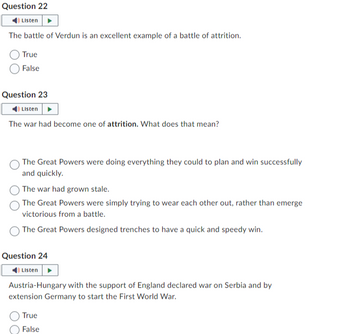Question
quick answer

Transcribed Image Text:Question 22
Listen
The battle of Verdun is an excellent example of a battle of attrition.
True
False
Question 23
Listen
The war had become one of attrition. What does that mean?
The Great Powers were doing everything they could to plan and win successfully
and quickly.
The war had grown stale.
The Great Powers were simply trying to wear each other out, rather than emerge
victorious from a battle.
The Great Powers designed trenches to have a quick and speedy win.
Question 24
Listen
Austria-Hungary with the support of England declared war on Serbia and by
extension Germany to start the First World War.
True
False
Expert Solution
arrow_forward
Step 1
“Since you have asked multiple questions, we will solve the first question for you. If you want any specific question to be solved then please specify the question number or post only that question.”
Question 22:
In the west front of France, the Verdun battle was held during the year 1916(Feb 21st-Dec 18th). The WW I longest battle occurred on hills north near Verdun-Meuse. There was a severe personnel shortage within the army of the Germans as a result of the enormous German fatalities at Verdun and the much higher number of deaths sustained on Somme. This shortage would worsen as the fight continued on.
Step by stepSolved in 2 steps
